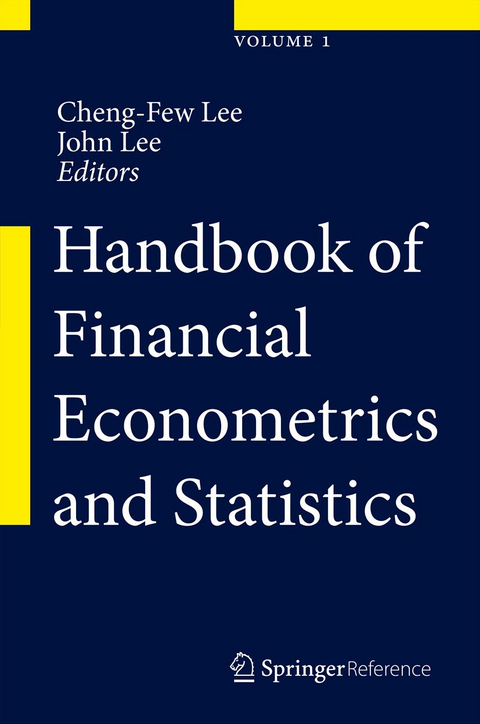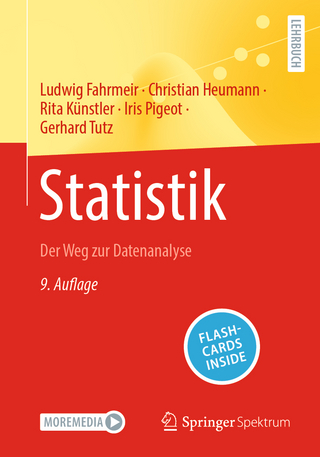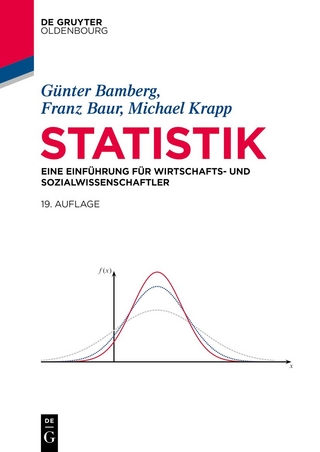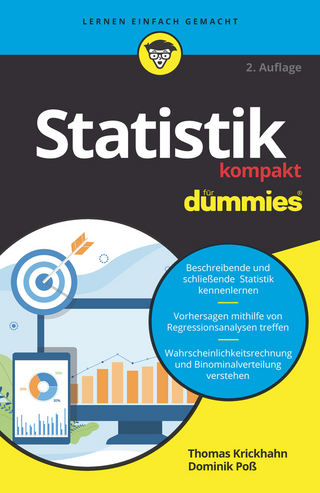
Handbook of Financial Econometrics and Statistics
Springer-Verlag New York Inc.
978-1-4614-7749-5 (ISBN)
The Handbook of Financial Econometrics and Statistics provides, in three volumes and over 100 chapters, a comprehensive overview of the primary methodologies in econometrics and statistics as applied to financial research. Including overviews of key concepts by the editors and in-depth contributions from leading scholars around the world, the Handbook is the definitive resource for both classic and cutting-edge theories, policies, and analytical techniques in the field. Volume 1 (Parts I and II) covers all of the essential theoretical and empirical approaches. Volumes 2 and 3 feature contributed entries that showcase the application of financial econometrics and statistics to such topics as asset pricing, investment and portfolio research, option pricing, mutual funds, and financial accounting research. Throughout, the Handbook offers illustrative case examples and applications, worked equations, and extensive references, and includes both subject and author indices.
Cheng-Few Lee is a Distinguished Professor of Finance at Rutgers Business School, Rutgers University and was chairperson of the Department of Finance from 1988-1995. He has also served on the faculty of the University of Illinois (IBE Professor of Finance) and the University of Georgia. He has maintained academic and consulting ties in Taiwan, Hong Kong, China and the United States for the past three decades. He has been a consultant to many prominent groups including, the American Insurance Group, the World Bank, the United Nations and The Marmon Group Inc., Wintek Corporation and Polaris Financial Group, etc. Professor Lee founded the Review of Quantitative Finance and Accounting (RQFA) in 1990 and the Review of Pacific Basin Financial Markets and Policies (RPBFMP) in 1998, and serves as managing editor for both journals. He was also a co-editor of the Financial Review (1985-1991) and the Quarterly Review of Economics and Business (1987-1989). In the past thirty-two years, Dr. Lee has written numerous textbooks ranging in subject matter from financial management to corporate finance, security analysis and portfolio management to financial analysis, planning and forecasting, and business statistics. Dr. Lee has also published more than 200 articles in more than twenty different journals in finance, accounting, economics, statistics, and management. Professor Lee has been ranked the most published finance professor worldwide during 1953-2008. Alice C. Lee is currently a Vice President in the Model Validation Group, Enterprise Risk Management, at State Street Corporation. Most recently, she was an Assistant Professor of Finance at San Francisco State University. She has over 20 years of experience and a diverse background, which includes academia, engineering, sales, and management consulting. Her primary areas of teaching and research are corporate finance and financial institutions. She is coauthor of Statistics for Business and Financial Economics, 2e (with Cheng F. Lee and John C. Lee) and Financial Analysis, Planning and Forecasting, 2e (with Cheng F. Lee and John C. Lee). In addition, she has co-edited other annual publications including Advances in Investment Analysis and Portfolio Management (with Cheng F. Lee). John C. Lee is a Microsoft Certified Professional in Microsoft Visual Basic and Microsoft Excel VBA. He has a Bachelor and Masters degree in accounting from the University of Illinois at Urbana-Champaign. John has worked over 20 years in both the business and technical fields as an accountant, auditor, systems analyst and as a business software developer. He is the author of the book on how to use MINITAB and Microsoft Excel to do statistical analysis which is a companion text to Statistics of Business and Financial Economics, of which he is one of the co-authors. In addition, he also published Financial Analysis, Planning and Forecasting, 2e (with Cheng F. Lee and Alice C. Lee). John has been a Senior Technology Officer at the Chase Manhattan Bank and Assistant Vice President at Merrill Lynch. Currently, he is the Director of the Center for PBBEF Research.
Introduction to Financial Econometrics and Statistics
Experience, Information Asymmetry, and Rational Forecast Bias
An Overview of Modeling Dimensions for Performance Appraisal of Global Mutual Funds
Simulation as a Research Tool for Market Architects
Motivations for Issuing Putable Debt: An Empirical Analysis
Multi Risk-Premia Model of U.S. Bank Returns: An Integration of CAPM and APT
Non-Parametric Bounds for European Option Prices
Can Time-Varying Copulas Improve Mean-Variance Portfolio?- Determinations of Corporate Earnings Forecast Accuracy: Taiwan Market Experience
Market-Based Accounting Research (MBAR) Models: A Test of ARIMAX Modeling
An Assessment of Copula Functions Approach in Conjunction with Factor Model in Portfolio Credit Risk Management
Assessing Importance of Time-Series versus Cross-Sectional Changes in Panel Data: A Study of International Variations in Ex-Ante Equity Premia and Financial Architecture
Does Banking Capital Reduce Risk?: An Application of Stochastic Frontier Analysis and GMM Approach
Evaluating Long-Horizon Event Study Methodology
Effect of Unexpected Volatility Shocks on Intertemporal Risk-Return Relation
Combinatorial Methods for Constructing Credit Risk Ratings
Dynamic Interactions in the Taiwan Stock Exchange: A Threshold VAR Model
Methods of Denoising Financial Data
Analysis of Financial Time-Series using Wavelet Methods
Composite Goodness-of-Fit Tests for Left Truncated Loss Sample
Effect of Merger on the Credit Rating and Performance of Taiwan Security Firms
On-/off-the-Run Yield Spread Puzzle: Evidence from Chinese Treasury Markets
Factor Copula for Defaultable Basket Credit Derivatives
Panel Data Analysis and Bootstrapping: Application to China Mutual Funds
Market Segmentation and Pricing of Closed-end Country Funds: An Empirical Analysis
A Comparison of Portfolios using Different Risk Measurements
Using Alternative Models and a Combining Technique in Credit Rating Forecasting: An Empirical Study
Can We Use the CAPM as an Investment Strategy?: An Intuitive CAPM and Efficiency Test
Group Decision Making Tools for Managerial Accounting and Finance Applications
Statistics Methods Applied in Employee Stock Options
Structural Change and Monitoring Tests
Consequences of Option Pricing of a Long Memory in Volatility
Seasonal aspects of Australian electricity market
Pricing Commercial Timberland Returns in the United States
Optimal Orthogonal Portfolios with Conditioning Information
Multi-Factor, Multi-Indicator Approach to Asset Pricing: Method and Empirical Evidence
Binomial OPM, Black-Scholes OPM and Their Relationship: Decision Tree and Microsoft Excel Approach
Dividend Payments and Share Repurchases of U.S. Firms: An Econometric Approach
Term Structure Modeling and Forecasting Using the Nelson-Siegel Model
The intertemporal relation between expected return and risk on currency
Quantile Regression and Value-at-Risk
Earnings Quality and Board Structure: Evidence from South East Asia
Rationality and Heterogeneity of Survey Forecasts of the Yen-Dollar Exchange Rate: A Reexamination
Stochastic Volatility Structures and Intra-Day Asset Price Dynamics
Optimal Asset Allocation under VaR Criterion: Taiwan Stock Market
Applications of Switching Model in Finance and Accounting
Matched Sample Comparison Group Analysis
A Quasi-Maximum Likelihood Estimation Strategy for Value-at-Risk Forecasting: Application to Equity Index FuturesA Markets
Computer Technology for Financial Service
Long-Run Stock Return and the Statistical Inference
Value-at-Risk Estimation via a Semi-Parametric Approach: Evidence from the Stock Markets
Modeling Multiple Asset Returns by a Time-Varying t Copula Model
Internet Bubble Examination with Mean-Variance Ratio
Quantile Regression in Risk Calibration
Strike Prices of Options for Overconfident Executives
Density and Conditional Distribution Based Specification Analysis
Assessing the Performance of Estimators Dealing with Measurement Errors
Realized Distributions of Dynamic Conditional Correlation and Volatility Thresholds in the Crude Oil, Gold and Dollar/Pound Currency Markets
Pre-IT Policy, Post-IT Policy, and the Real Sphere in Turkey
Determination of Capital Structure: A LISREL Model Approach
Evaluating the Effectiveness of Futures Hedging
Evidence on Earning Management by Integrated Oil and Gas Companies
A Comparative Study of Two Models SV with MCMC Algorithm
Internal Control Material Weakness, Analysts Accuracy and Bias, and Brokerage Reputation
What Increases Banks Vulnerability to Financial Crisis: Short-Term Financing or Illiquid Assets?- Accurate Formulae for Evaluating Barrier Options with Dividends Payout and the Application in Credit Risk Valuation
Pension Funds: Financial Econometrics on the Herding Phenomenon in Spain and the United Kingdom
Estimating the Correlation of Asset Returns: A Quantile Dependence Perspective
Multi-Criteria Decision Making for Evaluating Mutual Funds Investment Strategies
Econometric Analysis of Currency Carry Trade
Analytical Bounds for Treasury Bond Futures prices
Rating Dynamics of Fallen Angels and their Speculative Grade-Rated Peers: Static vs. Dynamic Approach
Creation and Control of Bubbles: Managers Compensation Schemes, Risk Aversion, and Wealth and Short Sale Constraints
Range Volatility: A Review of Models and Empirical Studies
Business Models: Applications to Capital Budgeting, Equity Value, and Return Attribution
VAR Models: Estimation, Inferences, and Applications
Model Selection for High-Dimensional Problems
Hedonic Regression Models
Optimal Payout Ratio under Uncertainty and the Flexibility Hypothesis: Theory and Empirical Evidence
Modeling Asset Returns with Skewness, Kurtosis, and Outliers
Alternative Models for Estimating the Cost of Equity Capital for Property/Casualty Insurers: Combined Estimator Approach
A VG-NGARCH Model for Impacts of Extreme Events on Stock Returns
Risk-Averse Portfolio Optimization via Stochastic Dominance Constraints
Implementation Problems and Solutions in Stochastic Volatility Models of the Heston Type
Stochastic Change-Point Models of Asset Returns and Their Volatilities
Unspanned Stochastic Volatilities and Interest Rate Derivatives Pricing
Alternative Equity Valuation Models
Time Series Models to Predict the Net Asset Value (NAV) of an Asset Allocation Mutual Fund VWELX
Discriminant Analysis and Factor Analysis: Theory And Method
Implied Volatility: Theory and Empirical Method
Measuring Credit Risk in a Factor Copula Model
Instantaneous Volatility Estimation by Nonparametric Fourier Transform Methods
A Dynamic CAPM with Supply Effect Theory and Empirical Results
A Generalized Model for Optimum Futures Hedge Ratio
Instrument Variable Approach to Correct for Endogeneity in Finance
Application of Poisson Mixtures in the Estimation of Probability of Informed Trading
CEO Stock Options and Analysts Forecast Accuracy and Bias
Option Pricing and Hedging Performance under Stochastic Volatility and Stochastic Interest Rates
THE LE CHATELIER PRINCIPLE OF THE CAPITAL MARKET EQUILIBRIUM
Econometric Measures of Liquidity.
| Erscheint lt. Verlag | 1.11.2014 |
|---|---|
| Reihe/Serie | Handbook of Financial Econometrics and Statistics | 1.10 |
| Zusatzinfo | biography |
| Verlagsort | New York |
| Sprache | englisch |
| Maße | 155 x 235 mm |
| Gewicht | 4952 g |
| Einbandart | gebunden |
| Themenwelt | Mathematik / Informatik ► Mathematik ► Statistik |
| Wirtschaft ► Betriebswirtschaft / Management ► Finanzierung | |
| Wirtschaft ► Volkswirtschaftslehre ► Ökonometrie | |
| Schlagworte | Asset Pricing • Corporate Finance • Econometrics • Financial Accounting • Financial institutions • Investment portfolio • Mutual Fund • New financial products • Option pricing • Quantitative Finance • risk analysis • Statistics |
| ISBN-10 | 1-4614-7749-2 / 1461477492 |
| ISBN-13 | 978-1-4614-7749-5 / 9781461477495 |
| Zustand | Neuware |
| Informationen gemäß Produktsicherheitsverordnung (GPSR) | |
| Haben Sie eine Frage zum Produkt? |
aus dem Bereich


